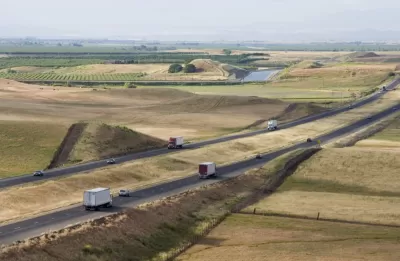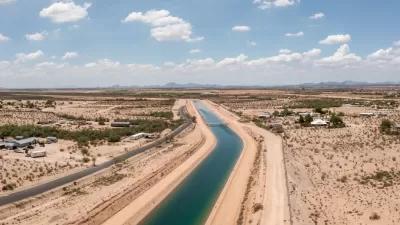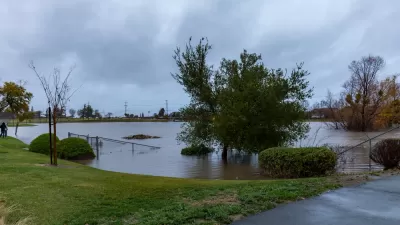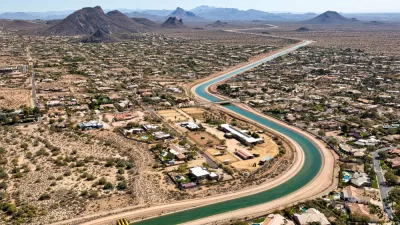A new state grant program will help California farmers convert idle land to new purposes in an effort to mitigate the environmental and economic effects of drought on the state's Central Valley.

As drought continues to strain California's water supply, Dustin Gardiner reports that "Farmers are being forced to fallow — a term for plowing land and leaving it unplanted — their fields and orchards in unprecedented numbers" due to restrictions imposed by the state's Sustainable Groundwater Management Act.
Leaving land fallow, however, can lead to more severe dust storms that would worsen the Central Valley's already dismal air quality. To compensate farmers for their lost revenue and prevent a future dust bowl, the state has allocated $50 million to a program that supports farmers in finding new uses for fallowed land. According to the article, "local organizations such as irrigation districts or municipalities will receive block grants, funding that must then be doled out to help farmers convert their land to uses that aim to improve air quality, conserve water or provide other community benefits."
The Multibenefit Land Repurposing Program will encourage farmers to repurpose their land in a variety of ways, such as restoring wildlife habitat, building recharge basins or renewable energy facilities, or converting land into parks.
In October, California Governor Gavin Newsom declared a statewide drought emergency, urging water agencies to consider implementing mandatory conservation measures as the state faces one of the worst droughts in its history.
FULL STORY: To fight off a California dust bowl, the state will pay farmers to reimagine idle land

Maui's Vacation Rental Debate Turns Ugly
Verbal attacks, misinformation campaigns and fistfights plague a high-stakes debate to convert thousands of vacation rentals into long-term housing.

Planetizen Federal Action Tracker
A weekly monitor of how Trump’s orders and actions are impacting planners and planning in America.

In Urban Planning, AI Prompting Could be the New Design Thinking
Creativity has long been key to great urban design. What if we see AI as our new creative partner?

Milwaukee Launches Vision Zero Plan
Seven years after the city signed its Complete Streets Policy, the city is doubling down on its efforts to eliminate traffic deaths.

Portland Raises Parking Fees to Pay for Street Maintenance
The city is struggling to bridge a massive budget gap at the Bureau of Transportation, which largely depleted its reserves during the Civd-19 pandemic.

Spokane Mayor Introduces Housing Reforms Package
Mayor Lisa Brown’s proposals include deferring or waiving some development fees to encourage more affordable housing development.
Urban Design for Planners 1: Software Tools
This six-course series explores essential urban design concepts using open source software and equips planners with the tools they need to participate fully in the urban design process.
Planning for Universal Design
Learn the tools for implementing Universal Design in planning regulations.
Gallatin County Department of Planning & Community Development
Heyer Gruel & Associates PA
JM Goldson LLC
City of Camden Redevelopment Agency
City of Astoria
Transportation Research & Education Center (TREC) at Portland State University
Jefferson Parish Government
Camden Redevelopment Agency
City of Claremont





























